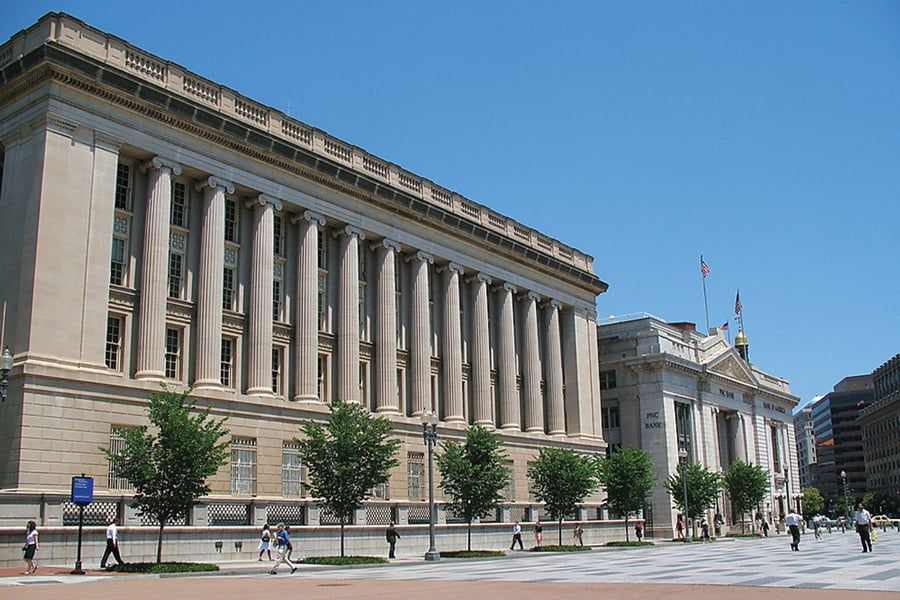

Charles Schwab Corp. has put its political activity in a deeper freeze by pulling out of one of the most prominent business trade associations in Washington, while another brokerage that halted political donations after the riot at the U.S. Capitol in January has begun to contribute again to campaigns.
Schwab is no longer a member of the U.S. Chamber of Commerce, a lobbying organization representing a wide swath of American companies that spends millions of dollars on political campaigns.
The move follows Schwab’s decision in January to shut down its corporate political action committee following the Jan. 6 violence at the Capitol. The Schwab PAC had collected donations from Schwab employees to contribute to House and Senate campaigns.
Schwab said that leaving the Chamber was related to its own pullback from political spending rather than a reaction to how the Chamber allocated its own political donations, which included backing some Democrats in 2020 races.
“Our decision to terminate our membership with the Chamber is unrelated to their political activities,” Schwab spokesman Jamaal Mobley said in a statement. “As you will have seen from our recent decision to discontinue our PAC, we have been reconsidering how we engage with policymakers.”
A Chamber spokesperson declined to comment. Schwab’s move was first reported by CNBC.
In addition to Schwab, several other brokerages or parent companies of brokerages halted political donations after the Capitol conflagration. They included Bank of America Corp., Morgan Stanley, JPMorgan Chase & Co. and Goldman Sachs Group Inc.
Only Morgan Stanley has resumed making political contributions through its PAC. It has donated $134,500 so far in the 2022 election cycle that began Jan. 1, according to its Federal Election Commission filing.
Fidelity Investments will continue to contribute to political campaigns but will keep the Capitol riot in mind.
“The Fidelity PAC constantly evaluates who it supports and will make changes if a member or candidate takes actions incompatible with the rationale for supporting them, including our strong support of the Constitution of the United States and the democratic process,” Fidelity spokesperson Eric Sandwen wrote in an email.
Many financial firms and industry trade associations have said they’re reconsidering their policies on PAC donations and whether they will continue to give to the 147 members of Congress who objected on Jan. 6 to the certification of the presidential election results that put Democratic nominee Joe Biden in the White House and ended Donald Trump’s presidency.
A study released by The Conference Board Thursday said companies are facing heightened scrutiny of political activity. The report was based in part on a survey of 84 public and private companies, 18% of which were in financial services.
Corporate America continues to try to exert influence in Washington.
“Most are still staying involved on the policy side and the political side,” said Paul Washington, a co-author of the study and executive director of The Conference Board’s ESG Center. “Now they’re sorting through how they will resume their PAC contributions.”
The challenge is to be politically engaged without damaging their corporate image.
“Companies are taking a fresh look at what they’re doing and where, if possible, to streamline their activities on what truly matters because they’re operating in an environment of increased scrutiny, polarization and risk,” Washington said.
The report recommends that companies align their political activity with their corporate values and educate customers, employees and investors about the political donations they make and the stances they take on issues.
The halt in corporate campaign donations probably won’t make a big difference in the funding of 2022 campaigns, but it will change how firms participate, Washington said.
“I don’t think what’s going on now is going to have a significant impact on political spending,” he said. “What companies are doing is addressing their corporate reputation and risk profile.”

Relationships are key to our business but advisors are often slow to engage in specific activities designed to foster them.

Whichever path you go down, act now while you're still in control.

Pro-bitcoin professionals, however, say the cryptocurrency has ushered in change.

“LPL has evolved significantly over the last decade and still wants to scale up,” says one industry executive.

Survey findings from the Nationwide Retirement Institute offers pearls of planning wisdom from 60- to 65-year-olds, as well as insights into concerns.
Streamline your outreach with Aidentified's AI-driven solutions
This season’s market volatility: Positioning for rate relief, income growth and the AI rebound
